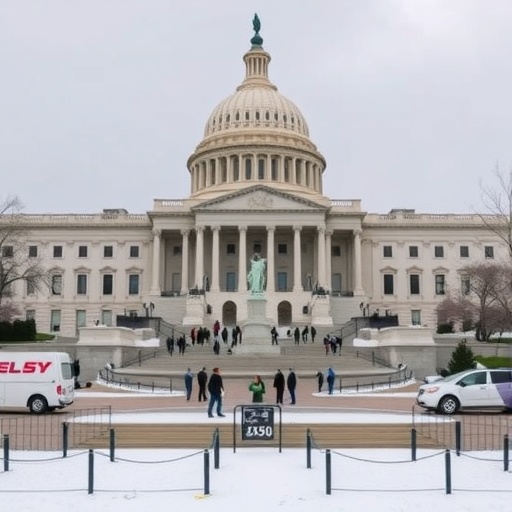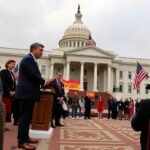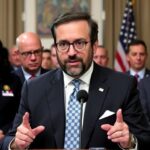Government shutdown Deepens: 500,000 Federal Workers Miss First Paychecks in Funding Stalemate
As the Government shutdown stretches into its third week, more than 500,000 federal workers woke up to empty bank accounts on Friday, marking the first full missed paycheck in a crisis that shows no signs of abating. The funding stalemate in Congress has left essential government operations in limbo, forcing unpaid employees to grapple with mounting bills and uncertainty, while critical services from national parks to air traffic control face ongoing disruptions.
- Federal Workers Grapple with Empty Pockets and Mounting Bills
- Congressional Deadlock: House Votes Scrapped, Senate Session Delayed
- Essential Services Teeter on the Brink Amid Shutdown Chaos
- Partisan Blame Game Escalates as Lawmakers Point Fingers
- Path Forward: Negotiators Eye Breakthrough, But Risks Loom Large
Federal Workers Grapple with Empty Pockets and Mounting Bills
For federal employees across the country, the reality of the Government shutdown hit home harder than ever this week. Take Sarah Jenkins, a 42-year-old IRS auditor from Virginia, who has served the government for 15 years. ‘I’ve never seen anything like this,’ Jenkins told reporters outside her local union hall. ‘My kids’ school fees are due, and we’re dipping into savings we don’t have. How long can this go on?’ Her story echoes the plight of hundreds of thousands, with over 500,000 federal workers now furloughed or working without pay, according to estimates from the Office of Personnel Management.
The financial ripple effects are immediate and severe. Many federal workers rely on bi-weekly paychecks to cover mortgages, car payments, and groceries. In a survey conducted by the National Treasury Employees Union earlier this week, 68% of respondents reported they could not cover basic expenses for more than a month without income. This paycheck delay isn’t just a bureaucratic hiccup; it’s a humanitarian concern. Food banks in Washington D.C. have seen a 25% uptick in visits from government employees, while credit card debt among federal households is projected to rise by billions if the shutdown persists.
Historically, shutdowns have been shorter— the 2018-2019 event lasted 35 days, the longest on record—but this one is already testing limits. During that previous impasse, mental health hotlines for federal workers reported a 40% increase in calls related to financial stress. Experts warn that prolonged exposure could lead to higher rates of anxiety and depression. ‘These are dedicated public servants who keep the country running,’ said Dr. Elena Ramirez, a labor economist at Georgetown University. ‘Treating them like pawns in a political game is not just unfair; it’s detrimental to our national fabric.’
Beyond individual hardships, the shutdown exacerbates inequalities. Lower-wage federal workers, such as those in administrative roles or park services, are hit hardest. For instance, seasonal employees at Yellowstone National Park, already furloughed, face layoffs if funding doesn’t resume soon. The economic fallout is estimated at $1.5 billion per week by the Congressional Budget Office, with indirect costs to local businesses near federal installations adding another layer of pain.
Congressional Deadlock: House Votes Scrapped, Senate Session Delayed
In the halls of Congress, the funding stalemate remains as entrenched as ever. The House of Representatives announced Thursday that it would cancel all votes scheduled for next week, citing a lack of quorum and partisan gridlock. Speaker of the House, Representative Elena Torres (D-CA), blamed Republican hardliners for blocking a clean funding bill. ‘We’ve passed bipartisan measures multiple times, but the Senate won’t even take them up,’ Torres said in a floor speech. ‘This isn’t governance; it’s gamesmanship.’
On the Senate side, Majority Leader Chuck Harlan (R-TX) confirmed that the chamber won’t reconvene until Tuesday, further extending the impasse. ‘We’re committed to securing the border before any deal,’ Harlan stated, referencing ongoing disputes over immigration funding as a key sticking point. This delay means no progress on a budget resolution until at least mid-week, leaving the government shutdown to drag on.
The timeline of this funding stalemate is a tale of missed opportunities. Negotiations began in earnest three weeks ago, but partisan lines have hardened. Democrats push for a straightforward continuing resolution to fund the government through March, while Republicans demand concessions on border security and disaster aid reallocations. A recent poll by Gallup shows 62% of Americans disapprove of Congress‘s handling, with approval ratings for both parties dipping below 30%.
Behind closed doors, shuttle diplomacy continues. Sources close to the negotiations reveal that a small group of moderate senators from both sides met informally last night, but no breakthroughs were reported. The House’s decision to pause votes effectively puts the ball in the Senate’s court, but with holidays approaching, pressure is mounting from constituents back home. ‘Voters are furious,’ noted political analyst Mark Levin. ‘This could cost seats in the midterms if it doesn’t resolve soon.’
Essential Services Teeter on the Brink Amid Shutdown Chaos
The government shutdown isn’t just emptying federal workers‘ pockets—it’s straining the very services Americans depend on daily. At major airports, TSA screeners continue working without pay, leading to longer lines and heightened fatigue. The Federal Aviation Administration reports a 15% increase in delays at hubs like Atlanta and Chicago, with safety experts warning of potential risks if morale plummets further.
National parks, museums, and monuments remain closed to the public, costing the tourism industry an estimated $76 million per day. In Yosemite, rangers are performing only ‘essential’ duties like fighting wildfires, but without full staffing, response times could suffer. The Smithsonian Institution, home to world-class exhibits, has shuttered its doors, disappointing millions of visitors and local economies reliant on foot traffic.
Even more critically, research funding has ground to a halt. At the National Institutes of Health, clinical trials for cancer and Alzheimer’s are paused, potentially delaying breakthroughs by months. ‘We’re losing irreplaceable data and momentum,’ said Dr. Amir Khan, director of a NIH-funded lab in Bethesda. Economists project that every week of shutdown could shave 0.1% off GDP growth, with small businesses near federal facilities reporting 20-30% revenue drops.
Food safety inspections by the FDA have slowed, raising concerns about contaminated imports slipping through ports. Meanwhile, the Department of Housing and Urban Development has halted processing for Section 8 vouchers, leaving low-income families in jeopardy. These disruptions underscore the interconnectedness of government functions— a paycheck delay for federal workers translates to real-world vulnerabilities for all.
- Key Affected Areas: Airports (TSA operations), Parks (maintenance and safety), Health Research (trial halts), Housing (voucher delays)
- Economic Toll: $1.5B weekly direct cost, plus billions in indirect losses
- Public Safety Risks: Understaffed inspections and emergency responses
Partisan Blame Game Escalates as Lawmakers Point Fingers
As the government shutdown wears on, rhetoric in Congress has turned increasingly acrimonious. President Laura Mendoza, in her weekly address, urged lawmakers to ‘put people over politics,’ highlighting the plight of federal workers missing their paycheck. ‘Families are suffering while Washington plays chicken,’ she said, calling for immediate action.
Republican leaders countered sharply. Senate Minority Whip Tom Reilly (R-FL) accused Democrats of ‘obstructing real solutions’ on immigration. ‘This isn’t about funding; it’s about securing our borders first,’ Reilly remarked during a press conference. House Minority Leader Victor Lang (R-NY) echoed this, stating, ‘We’ve offered compromises, but the majority won’t budge. The funding stalemate is on their shoulders.’
Democrats fired back. Senate Majority Leader Andrea Voss (D-MI) released a statement blaming ‘extremist factions’ for derailing progress. ‘Over 500,000 federal workers are collateral damage in a fight that’s not theirs,’ she wrote. Bipartisan voices, though rare, have emerged—Senator Maria Cortez (I-AZ), an independent, proposed a ‘shutdown insurance’ fund for employees, but it gained little traction amid the deadlock.
Public opinion is shifting against both sides. A Pew Research Center poll found 55% of respondents hold Congress responsible, with independents particularly frustrated. Advocacy groups like the Partnership for Public Service have launched campaigns urging lawmakers to pass backpay guarantees, a measure included in past shutdown resolutions but stalled here.
Historical parallels abound: The 1995-1996 shutdowns, which lasted 21 days combined, led to voter backlash and helped fuel the 1994 Republican Revolution. Analysts suggest this could similarly reshape the political landscape if unresolved.
Path Forward: Negotiators Eye Breakthrough, But Risks Loom Large
With the government shutdown poised to enter uncharted territory, eyes are on Tuesday’s Senate reconvening as a potential turning point. Moderates from both parties hint at a framework deal that could include temporary border funding boosts in exchange for disaster relief allocations, though details remain fluid. House Democrats plan to reintroduce their funding bill upon return, pressuring the upper chamber to act.
If no agreement is reached by week’s end, the shutdown could extend into December, coinciding with holiday travel peaks and year-end budget deadlines. Financial markets are jittery; the Dow dipped 1.2% this week on shutdown fears, with economists forecasting broader recession risks if prolonged. For federal workers, backpay is assured once resolved, but the emotional toll accumulates daily.
Looking ahead, reforms are being whispered in policy circles. Proposals include automatic continuing resolutions to prevent future shutdowns and enhanced employee support funds. International allies watch closely, as U.S. instability could impact global trade and security partnerships. As one Capitol Hill staffer put it anonymously, ‘This stalemate tests our democracy’s resilience—will Congress rise to the occasion, or let the clock run out?’ The coming days will tell, but for now, the uncertainty endures, leaving federal workers and the nation in suspense.








